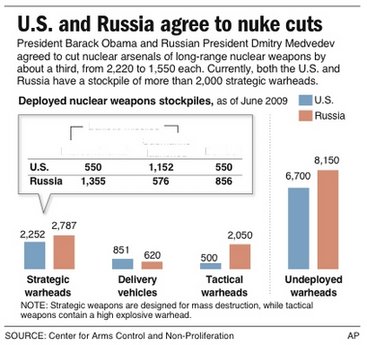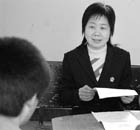Global General
US to adopt new policy on using nuclear arms
(Agencies)
Updated: 2010-04-06 10:41
 |
Large Medium Small |
WASHINGTON - The Obama administration is poised to adopt a new policy restricting the nation's use of nuclear arms, US officials said, and hopes to persuade Russia to agree to mutual cuts in nuclear arsenals that go beyond the arms treaty both sides will sign this week.
|
|
A policy review, expected to be released Tuesday, will include language reducing US reliance on nuclear weapons for its national defense. That reflects President Barack Obama's pledge to move toward a nuclear free world, and could strengthen US arguments that other countries should either reduce stockpiles of nuclear weapons or forego developing them.
The White House also planned to urge Russia to adopt first-ever limits on shorter-range, less powerful nuclear weapons, an arena in which Russia holds an advantage, said officials who spoke on condition of anonymity because the policy review has not been released.
Officials said the document was expected to say the US is moving toward a policy in which the "sole purpose" of nuclear weapons is to deter or respond to nuclear attack. That wording would rule out the use of such weapons to respond to an attack by conventional, biological or chemical weapons. Previous US policy was more ambiguous.
In an interview with the New York Times on Monday, Obama said his administration was explicitly committing not to use nuclear weapons against non-nuclear states that are in compliance with the Nuclear Non-Proliferation Treaty, even if they attacked the United States with biological or chemical weapons. Those threats, he told the newspaper, could be deterred with "a series of graded options" -- a combination of old and newly designed conventional weapons.
On Monday evening the White House provided a brief outline of the new nuclear policy, which it said reflects a commitment to renew arms control and work with Russia to reduce nuclear forces while maintaining a stable military balance. It said substantial new US investments in the weapons laboratories and other technological undergirdings of the nuclear arsenal will "facilitate further nuclear reductions," and extend the life of warheads currently in the nuclear force.
"This is an alternative to developing new nuclear weapons, which we reject," the White House statement said.
The Obama administration plans to urge Russia to return to the bargaining table following Senate ratification of the new START arms reduction treaty, to be signed by Obama and Russian President Dmitry Medvedev in Prague on Thursday.
The White House hopes to overcome Russia's expressed reluctance to move beyond START, especially if it means cutting Moscow's arsenal of tactical, or short-range nuclear arms.
These so-called theater nuclear weapons play a key role in Russia's overall defense strategy and are regarded in Moscow as an important bargaining chip on security issues.
The timing of a planned US push for new, broader arms talks with Russia is uncertain. But officials said the proposal would only come after US and Russian legislative approval of the new START pact, which isn't expected until the end of this year.The Russian parliament is almost certain to sign off on any deal negotiated by the Kremlin, but the US Senate's ratification of the new START treaty is far from a sure thing.
Obama is hosting dozens of world leaders in a nuclear security summit in Washington next week.












